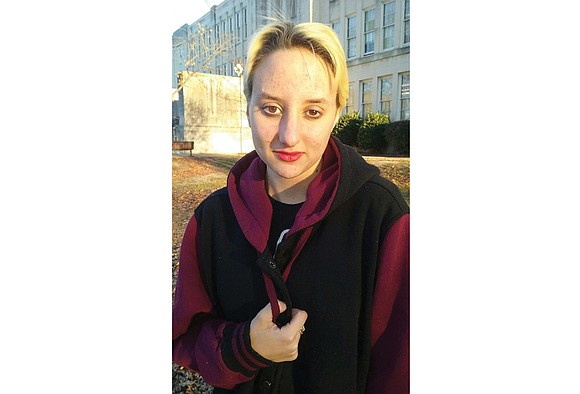Debate over treatment of autistic student to be battled out in court
Jeremy M. Lazarus | 2/3/2017, 8:19 p.m.
Stephanie Priddy, a senior at Thomas Jefferson High School, was taken out of the West End school in police handcuffs.
Her crime: Going to class.
Next week, a Richmond judge is scheduled to decide whether the 18-year-old student is guilty of trespassing at the school on Dec. 9, as school officials allege.
Principal Darin A. Thompson alleges that Stephanie and her family defied a warning that she would be subject to arrest and entered the school anyway, forcing him to call police.
At issue is whether Stephanie, who has been diagnosed with autism and has an individualized education plan or IEP, was still enrolled at Thomas Jefferson High, as she and her family claim, or whether she was supposed to be attending Huguenot High School in South Side, as school officials claim.
Stephanie denies she trespassed because she was still listed on Thomas Jefferson’s student rolls on Dec. 9, and workers in the school’s office had issued her a permission slip to attend class, where the principal had her arrested.
Since her arrest, Stephanie has not returned to Richmond Public Schools, insisting she should be readmitted to Thomas Jefferson.
“I’ve always gone to TJ, and I was looking forward to graduating with my friends,” she said.
She and her supporters are hoping the case — set to be heard 9 a.m. Monday, Feb. 6, in the Marsh General District Court in South Side — will spotlight what they allege is RPS’ disregard for federal and state laws about disabled students and will show that TJ officials improperly had her removed and transferred to Huguenot High, the zone school she would attend because she lives in South Side.
While Stephanie said that the arrest was a bit scary, she sees herself as a test case for disabled students seeking to fight back when they and their parents believe the school system is flouting laws and regulations for students with IEPs.
RPS officials insist that the school system abides by such laws and its actions were warranted by the family’s refusal to withdraw Stephanie from Thomas Jefferson. However, Kandise Lucas, who is an advocate for Stephanie, sees it otherwise, stating that her arrest and removal from the school was done “in violation of laws that protect students with special needs from egregious disciplinary actions such as this.”
Stephanie’s enrollment in Thomas Jefferson was not guaranteed, according to school documents. While she is considered high-functioning and able to participate in regular classes, she was permitted to enroll in Thomas Jefferson as an out-of-zone student with a provision that she meet school attendance requirements. She also has a younger brother at the school.
According to notices from Mr. Thompson and other administrators, Stephanie was notified that her enrollment at Thomas Jefferson was canceled because she had at least 10 unexcused absences, and she was required to return to Huguenot.
“The family was advised on numerous occasions, including the day of (Stephanie’s arrest) … the student was in violation of the open enrollment agreement,” RPS spokeswoman Kenita Bowers stated, in response to a Free Press query.
Ms. Bowers stated the record of missed school days was accurate and that the school’s administration “made numerous attempts to address the challenges in the student’s attendance.”
However, Stephanie and her mother, Michelle Priddy, claim that school officials failed to account for her excused absences when she had doctor or dentist appointments for which she provided documentation.
The Priddys also said that on most of the days when the school reported Stephanie as absent, she actually was at the school.
“I drove her to school every day with her brother unless she had an appointment,” her mother said. “I would often get a call from the school reporting her as absent. But when I called her or her brother to find out what was going on, she would be in school studying.”
Mrs. Priddy and Ms. Lucas claim that teachers reported Stephanie absent even though she was sitting with her case manager or was in the school counselor’s office.
Stephanie “would go to them when she experienced anxiety attacks, as she was directed to do by the TJ staff,” Ms. Lucas stated in an email to Richmond School Superintendent Dana T. Bedden and members of the Richmond School Board, who have declined to intervene in the case.
However, Ms. Lucas added that neither the case manager nor the school counselor “maintained a record as to when she was with them, nor did they communicate with her teachers, resulting in (Stephanie) being falsely documented as skipping class when she was exercising a behavior support accommodation for her disability.”
Ms. Lucas stated that the school received a corrected attendance record during a Dec. 8 meeting with her and Mrs. Priddy that “does not reflect 10 unexcused absences.” She stated that William Andrews, an assistant principal, confirmed in that meeting that “truancy was not an issue,” eliminating the reason for ending Stephanie’s enrollment.
In Ms. Lucas’ view, “the district has made a horrific error. Stephanie deserves and is legally entitled to attend TJ and graduate from that school.”







